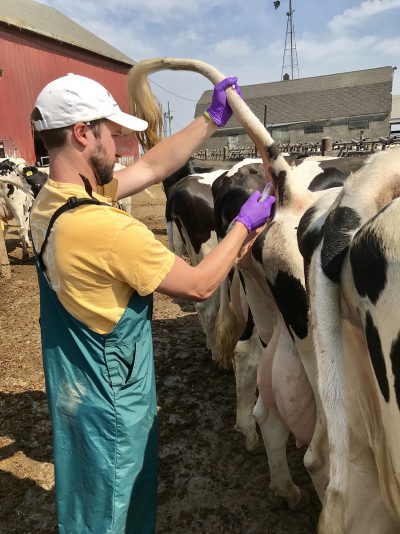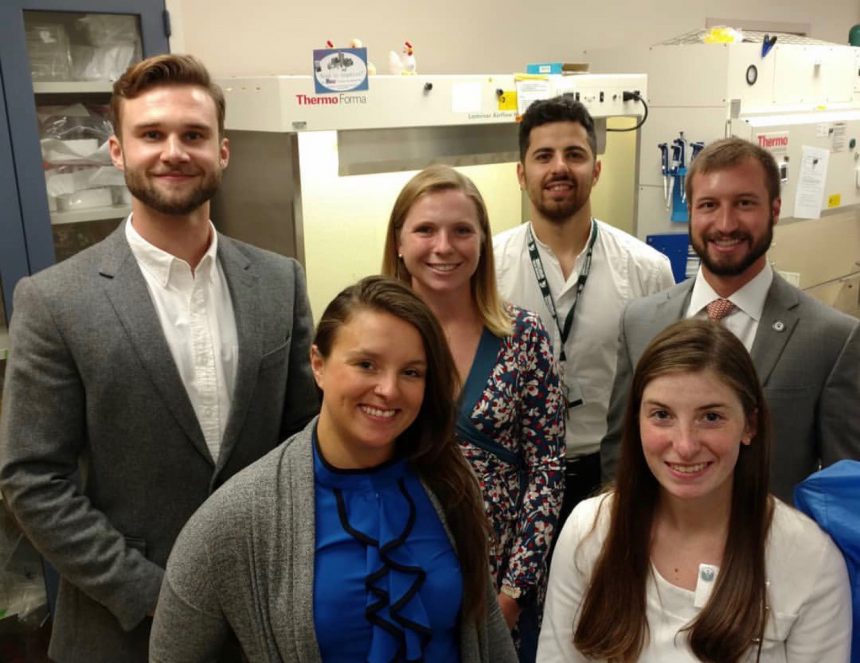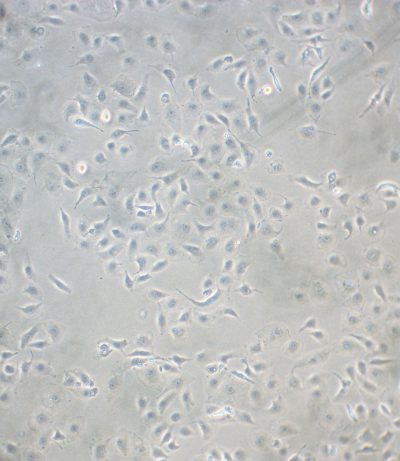The Meadow Brook Chair
The Meadow Brook Chair in Farm Animal Health and Well-being was created by a $2 million endowment from the Matilda R. Wilson Fund. The Chair works to enhance and ensure the health, nutrition, and well-being of farm animals through large animal food and nutritional research and teaching.
For three weeks before and after calving, dairy cows enter what is known as the transition period. More than 75 percent of all disease in dairy cows occurs during the transition period, due in part to the metabolic demands faced during this phase. Transition diseases represent the greatest veterinary cost to producers for their treatment and significantly reduce subsequent milk production and quality.

Many of these diseases—including both metabolic diseases, such as ketosis, and infectious diseases, such as mastitis—can be linked to inflammatory dysfunction, a state of inappropriate inflammatory responses.
“Inflammatory dysfunction itself does not cause a specific disease, but because it prevents a cow from mounting an appropriate immune response to invading pathogens, it can predispose cows to disease,” says Dr. Matt Kuhn, PhD candidate at the MSU College of Veterinary Medicine. “This predisposition allows some cows to appear clinically normal, yet become sick very quickly when their immune systems are challenged.”
While this is well known, there’s still a lack of solutions within the industry. The Meadow Brook Immunobiology Laboratory is working to develop solutions that will control mastitis and other diseases in dairy cattle. Research generated here has offered an understanding of why cows succumb to mastitis and how metabolic stress impacts transition cow diseases. Through this research, scientists and dairy producers are provided with an understanding of therapeutic targets to pursue.
Meet the people behind the Meadow Brook Immunobiology Laboratory
Faculty
Dr. Lorraine Sordillo earned her MS from the University of Massachusetts—Amhurst and her PhD from Louisiana State University. She is the inaugural Meadow Brook Chair in Farm Animal Health and Well-being and leads the Meadow Brook Immunobiology Laboratory. Sordillo works to develop solutions that will control mastitis in dairy cattle. In pursuit of this goal, she researches the interaction between nutrition, oxidative stress, and immunology during times of increased susceptibility to disease. Her work has resulted in more than 140 papers of scientific literature; she has led or co-led grants that total more than $14,000,000. She also is part of the Quality Milk Alliance, which aims to cut antibiotic use in diary cattle by half and mastitis by one-third.

Students
Dr. Matt Kuhn is originally from Mattawan, Michigan, and completed his BS in Animal Science in 2013 and his DVM in 2018, both from Michigan State University. He currently is pursuing his PhD with expected graduation in 2020. After graduation, Kuhn hopes to pursue a career in science policy and legislative affairs. In his spare time, he enjoys spending time outdoors hiking and camping with his wife, Michelle, and dogs, Turk and Tru.
Lauren Wisnieski is a PhD candidate in the MSU College of Veterinary Medicine’s Comparative Medicine and Integrative Biology Program. Her dissertation research focuses on building predictive models for disease outcomes in dairy cows using a number of biomarkers prior to calving. After graduating, Wisnieski plans to pursue a career in research and teaching with a focus on animal disease modeling.
Ashley Putman is a second-year PhD student and a fourth-year veterinary student. Her research focuses on the dry period during a cow’s lactation cycle and the role of isoprostanes, a biomarker of oxidative stress. Her goal is to pursue research that will benefit producers and animals through new management practices.
Carsten Walker is a first-year PhD student interested in the effects of micronutrient supplementation on oxidative stress and immune function. He is an MSU alumnus in Zoology and Animal Science, and has worked as a nutrition consultant and farm manager.
Dr. Jaimie Strickland is pursuing a PhD at the MSU College of Veterinary Medicine; she earned her DVM and MS from Michigan State University. She began her career in private practice, when she worked on large dairies in New Mexico and California before she returned to MSU and completed a residency in nutrition and toxicology, in addition to her graduate training. She is researching vitamins and their ability to modulate oxidative stress in order to improve immune function and infectious disease response in dairy cattle. Additionally, Strickland is a Foundation for Food and Agriculture Research professional development fellow.

Staff
Jeff Gandy is the manager for the Laboratory. He managed a third-generation dairy farm in Louisiana and has more than 30 years of research experience, including dairy, beef, and swine. Jeff has become a key leader in the College and campus-wide for his expertise in using advanced techniques to measure very specific metabolites, such as through liquid chromatography mass spectrometry (LC/MS). He collaborates with a number of other laboratories to assist them with sample preparation, extraction, quantitation, and analysis.
Jennifer Brown is the technician for the Laboratory. She completed her BS and MS degrees in Animal Science, both at Michigan State University. She is interested in a research or industry career that deals with nutritional immunology.
